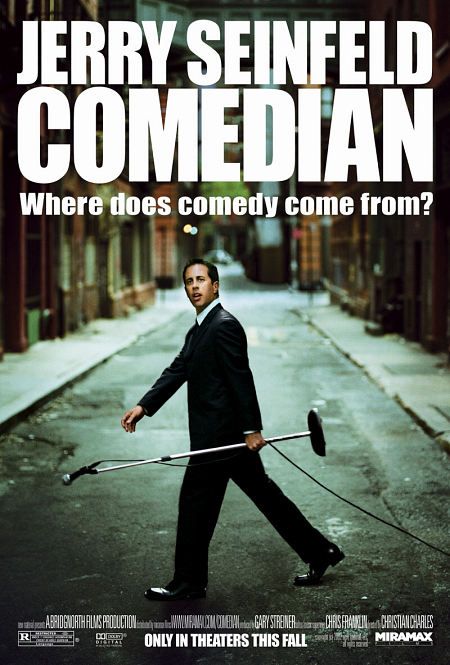1) One of the key scenes in this film is early on, when we are privy to a conversation between Jerry Seinfeld and Orny Adams. There's a real sense that both men want to be at the other's position, which sets up one of the themes of the film--namely, that no matter where these comedians are on the ladder to success, they still think they're Not Quite There Yet.
2) ...which is furthermore driven home by the scene toward the end when Seinfeld pays a visit to Bill Cosby...seeing Seinfeld acting totally like a newbie fan, practically genuflecting before Cosby and taking in all the advice the elder man gives him, is fascinating.
3) There have been a number of documentaries that have been accused of making characters out to be heroes and villains through judicious cutting and strategic scene choice. I get the impression director Christian Charles tries to make Orny out to be a villain, but he ends up coming off as more pathetic and desperate other than monstrous. Even when he is badmouthing the comedian who just gave him decent advice, you feel that the person Adams hates the most is himself.
4) I respect that Charles makes the choice not to show us the bulk of key appearances both Seinfeld and Orny make during the course of the film--he ends up showing us Seinfeld's performance in a Washington DC night club representing his first hour long set only in the pauses, and the opening moments of Adams' debut on Letterman in long shot, on a monitor in an empty dressing room. It's as if Charles knows that the actual acts aren't as important as the journeys that are being taken.
5) That being said...one of the weaknesses of the film is the way Adams sort of disappears a little more than halfway through the film's running time. It's as if Charles loses interest in him as a compare and contrast to Seinfeld.
6) Oddly enough, the second weakness is the sudden appearance at roughly the same time of Seinfeld's family. Charles has been successful for the film's running time focusing solely on Seinfeld as a professional being; suddenly having his wife and child showing up (especially when we see them hanging out in his dressing room at Letterman) smacks of artifice.
7) But without a doubt the biggest piece of artifice, and the one moment where the film just collapses totally for a bit, is when Seinfeld takes a trip to the Museum of Television and watches old tapes of The Ed Sullivan Show and 'laughing' at the comedians showcased therein. This is the one moment that feels thoroughly and absolutely made up and calculated to make us go 'awwwww.'
8) I really love how we get a better sense of a number of comedians--including, biggest shock of all, Jay Leno--and appreciate them more as human beings. Colin Quinn in particular comes off as smarter than he ever has.
9) If I was Charles, I would have not brought up the handful of pop songs in the last third of the film. Up until then, the music has been very subtle, usually confined to ambient use...but in that last leg, where 'Deacon's Blues' by Steely Dan blares out of the speakers while Jerry enters into a theater before a full show, it comes off as manipulative.
10) Charles does ultimately give us bits of both Seinfeld's and Adam's acts, but juuuuust enough. If there were any more, it might interfere with the approach of the documentary, taking away from its treatment of comedy as a business and not as an artform.
Overall...an interesting documentary more for the insights into the business and culture of comedy than as a portrait of a major comedian. There are a number of missteps, but it is more than made up for with the real peek into the real community of the comedians depicted within.

No comments:
Post a Comment